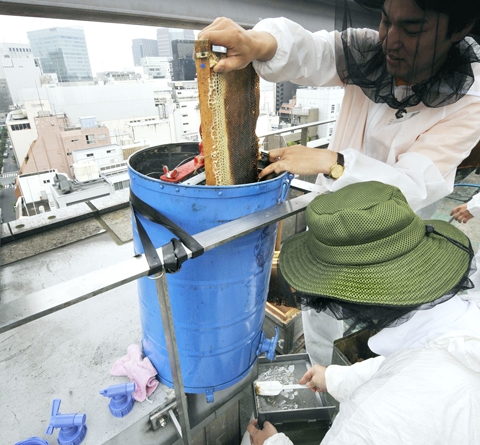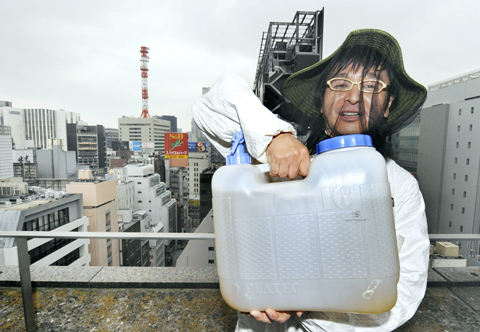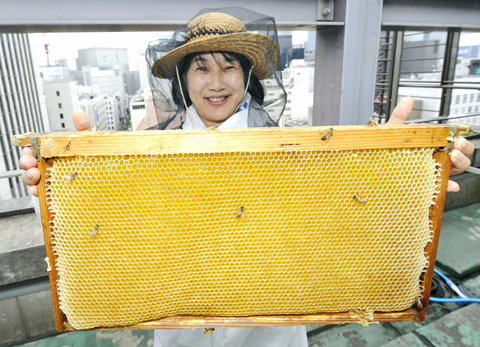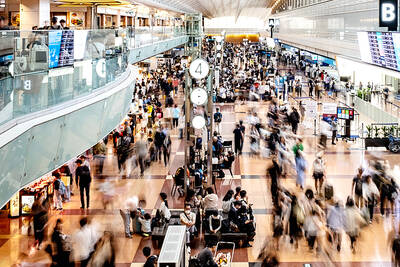Tokyo’s Ginza district is usually abuzz with shoppers and office workers, but high above its skyscrapers nature-lovers have created a home for real busy bees — the ones that make honey.
It’s part of a project to bring a slice of natural life back to the center of the world’s largest urban sprawl, a cityscape home to more than 30 million people that stretches far beyond the horizon.
Eleven stories above the heart of the Tokyo concrete jungle — with its beehive office partitions and swarms of suit-clad worker-bees — enthusiasts have stacked up beehives dripping with golden honey.

PHOTO: AFP
“Let’s enjoy the harvest, but be careful you don’t have an accident,” urban beekeeper-in-chief Kazuo Takayasu tells his fellow volunteers from behind the protective fine-mesh net covering his face.
Clad in white body suits, the crew gets to work, squeezing out the glistening syrup using a simple centrifugal machine they crank by hand as a cloud of bees breaks free from the honeycombs.
“Don’t be scared. They don’t sting unless you harm them,” says Satoshi Nagai, 49, who has taken a break from his desk at Mitsubishi UFJ Morgan Stanley Securities. “Try the honey. The scent has a touch of citrus.”

PHOTO: AFP
The honey is largely organic, he said, because pesticide use has been banned in Tokyo city parks and gardens including the Imperial Palace, about 1.5km away, where the bees collect much of their nectar.
“Through beekeeping, you get to learn how harmful pesticides are for insects,” he said. “It makes you think about your hobby of playing golf on courses which cannot be maintained without pesticides.”
The beekeepers may be an odd sight in the Japanese capital, but they are not the only urban farmers — on a rooftop just blocks away, barefoot farmers were recently wading through almost knee-high mud to plant a wet rice field.

PHOTO: AFP
On top of the building of the Hakutsuru Sake Brewing Co, its employees and their spouses and children are screaming with excitement as they stomp barefoot, the mud squelching between their toes.
“Good job, good job! Well done!” says Asami Oda, 56, the vice president of Hakutsuru’s Tokyo office, who takes care of the rice paddies every day. “We harvest 60kg of rice every year, from which we make 80L of sake. Of course it’s organic. I like having a pesticides-free harvest, which is also good for the honey bees,” he says.
Projects such as these have gained attention here this year as Japan readies to host a 193-nation international conference on biodiversity, which aims to find ways to stem the world’s massive species loss.
The 10th meeting of the Convention on Biological Diversity will be held in the central city of Nagoya in October to discuss a pressing environmental issue that has received less attention in recent years than climate change.
Animal and plant species are disappearing around the world at the fastest rate known in geological history and most of these extinctions are tied to human activity, the UN Environment Programme says.
Species under threat include 21 percent of all known mammals, 30 percent of known amphibians and 12 percent of known birds, according to the International Union for Conservation of Nature.
The Earth is now losing a species about once every 20 minutes, the non-profit group Conservation International estimates.
Scientists warn that wildlife habitat destruction is destroying ecosystems that give humans “environmental services” such as clean water and air and are vital for climate control and food production.
Honeybees are a case in point in Japan.
The price of honeybees has doubled in recent years after imports were banned to prevent the spread of parasites and as local populations declined in a phenomenon that beekeepers have blamed on pesticide use.
Because of the shortage of bees that help pollination, farmers have reported that fruits don’t grow well enough to satisfy urban consumers.
“We’ve received a number of complaints from beekeepers that pesticides kill honeybees,” Kazuo Kimura of the Japan Beekeepers Association says.
Japanese scientists taking part in the biodiversity meeting have discussed ways to convince Japan’s highly urbanized public how important biodiversity is.
“Urban beekeeping and rice growing are good examples of how human beings can reshape their relationship with nature,” says Kazuhiko Takeuchi, director of the Institute for Sustainability and Peace at the UN University in Tokyo. “Above all, it’s effective in changing people’s mindsets.”

CHIPMAKING INVESTMENT: J.W. Kuo told legislators that Department of Investment Review approval would be needed were Washington to seek a TSMC board seat Minister of Economic Affairs J.W. Kuo (郭智輝) yesterday said he received information about a possible US government investment in Taiwan Semiconductor Manufacturing Co (TSMC, 台積電) and an assessment of the possible effect on the firm requires further discussion. If the US were to invest in TSMC, the plan would need to be reviewed by the Department of Investment Review, Kuo told reporters ahead of a hearing of the legislature’s Economics Committee. Kuo’s remarks came after US Secretary of Commerce Howard Lutnick on Tuesday said that the US government is looking into the federal government taking equity stakes in computer chip manufacturers that

NORTHERN STRIKE: Taiwanese military personnel have been training ‘in strategic and tactical battle operations’ in Michigan, a former US diplomat said More than 500 Taiwanese troops participated in this year’s Northern Strike military exercise held at Lake Michigan by the US, a Pentagon-run news outlet reported yesterday. The Michigan National Guard-sponsored drill involved 7,500 military personnel from 36 nations and territories around the world, the Stars and Stripes said. This year’s edition of Northern Strike, which concluded on Sunday, simulated a war in the Indo-Pacific region in a departure from its traditional European focus, it said. The change indicated a greater shift in the US armed forces’ attention to a potential conflict in Asia, it added. Citing a briefing by a Michigan National Guard senior

POWER PLANT POLL: The TPP said the number of ‘yes’ votes showed that the energy policy should be corrected, and the KMT said the result was a win for the people’s voice The government does not rule out advanced nuclear energy generation if it meets the government’s three prerequisites, President William Lai (賴清德) said last night after the number of votes in favor of restarting a nuclear power plant outnumbered the “no” votes in a referendum yesterday. The referendum failed to pass, despite getting more “yes” votes, as the Referendum Act (公民投票法) states that the vote would only pass if the votes in favor account for more than one-fourth of the total number of eligible voters and outnumber the opposing votes. Yesterday’s referendum question was: “Do you agree that the Ma-anshan Nuclear Power Plant

ENHANCED SECURITY: A Japanese report said that the MOU is about the sharing of information on foreign nationals entering Japan from Taiwan in the event of an emergency The Ministry of Foreign Affairs yesterday confirmed that Taiwan and Japan had signed an agreement to promote information exchanges and cooperation on border management, although it did not disclose more details on the pact. Ministry spokesman Hsiao Kuang-wei (蕭光偉) said the ministry is happy to see that the two nations continue to enhance cooperation on immigration control, in particular because Taiwan and Japan “share a deep friendship and frequent people-to-people exchanges.” “Last year, more than 7.32 million visits were made between the two countries, making it even more crucial for both sides to work closer on immigration and border control,” he said. Hsiao